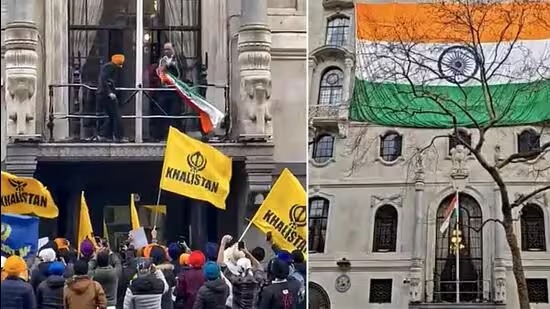
India’s national security advisor (NSA) met with the British Counterpart Tim Borrow at Sardar Patel Bhawan in Delhi as both of them discussed the strategic Indo- UK ties with each other, among the other issues that persist. During the bilateral talks, the Indian NSA Ajit Doval raised the issue of extremist elements that continue to torment and Threaten both India and Britain, especially the pro-Khalistani terrorists that threaten the security of the Indian diplomats at the Indian High Commission, resorting to violence.
Ajit Doval Urged the British Government to take immediate and strict action against such radical and separatist elements using means such as deportation or legal prosecution if they have to, and not keep mum about the issue, especially due to the growing violence by these Radical Terrorists. While they regularly meet and have engaged in timely extensive decisions on bilateral, regional and global agenda, the current visit will also allow them to continue and include a review of all the multifaceted cooperation between both nations and explore futuristic areas for technology collaboration.
While both the officials met for a very restricted discussion on regional cooperation and global issues of mutual trust. This was later followed by a delegation-level talk where both nations engaged and reaffirmed their close strategic partnership to accord maximum prioritization and further enhance security arrangements.
NSA’S Ajit Doval has been in touch with the British Government since the emergence of the pro khalistani extremism against Hindus, Indians and specifically against India. Time and again, New Delhi has voiced serious concerns about the cosmic impact of such instances that specifically affects the bilateral ties between both nations.
India’s Demands Deportation of Terrorists
Indian NSA has pushed Britain to deport the Khalistani radicals and terrorists and take action on those elements who dared to attack the Indian High Commission. Doval told Barrow that India seeks the legal prosecution of those who dared to attack and target Indian diplomats. Earlier, the External Affairs Ministry spokesman Arindam Bagchi slammed the growing instances of hate crimes and violence by these radical terrorist outfits in countries like the UK, Canada and other countries and also that space for such radical, extremist and terrorist elements must not be given in the name of freedom of speech and expression.
The External Affairs spokesman Arindam Bagchi in a media briefing, asserted that the safety and the security of the Indian diplomats and the country’s missions are of utmost importance to the Government. However, “The issue is not about the freedom of speech and expression but its utter misuse for the advocacy of violence and the propagation of separatism and legitimation terrorism,” he asserted.
The meeting comes at a crucial juncture after the UK-based head of the Khalistan Liberation Force (Avtar Singh Khanda), also believed to be the handler of Amritpal Singh, head of Waris Punjab De (A Sikh Separatist Political Group) and the man who pulled down the Indian Flag during separatist demonstrations outside London High Commission was detained and allegedly died in a hospital in Birmingham.
India Warns After the Embassy Attack
The Indian Government, in a stern demand, has requested the Government of the UK to identify and punish the perpetrators who were responsible for pulling down the Indian national flag at its embassy in London. At the same time, India also equally stressed for the UK Government to ensure a high level of security at the Indian High Commission and the Indian Diplomats to prevent any such attacks not just by the Khalistani separatists but by anyone else and Indian missions abroad.
Foreign Secretary Kwatra summoned the UK counterpart and demanded an explanation from the UK. India asked the UK to prosecute the miscreants involved in the terrorist activities and also pressed the need for adequate security at the High Commission.
India’s external Affairs Ministry summoned the senior diplomat and demanded a sharply worded explanation from the British Government about the “Absence of Security” at the high commission premises. New Delhi accused the UK of indifference to Indian diplomats and envoys.
In Response, India withdrew security cover outside the British High Commission and the envoy’s residence, and the barricades placed outside the UK mission outside Shantipath in the Chanakyapuri diplomatic enclave and the British High Commissioner Alex Ellis’s residence were removed.
However, the move was more of a symbolic gesture as the general security around the area was tightened, and intelligence officers also kept a hawk-eye vigil on the movement close to the premises and Chanakyapuri and Rajaji Marg and that the British didn’t want to comment on the lapse of security that led to the attack on the Indian embassy by Khalistani terrorists.
India even demanded an explanation over the complete absence of British Security that allowed such elements to enter the premises, read EAN’s statement. However, UK’s foreign minister James Cleverly, assured Vikram Doraiswami and the Consul General, who were the targets of the terrorists, that the safety and security of the staff at the High Commission is paramount.
Pro-Khalistani Groups seem to be rattled at the death of their leader but have also issued posters to incite violence against senior Indian diplomats in the UK, US, Canada and Australia, a direct threat to India that will not just go unanswered if any extremist elements decide India or its embassies abroad.
UK’s foreign secretary stated that the real test of Britain and the British Authorities would deal with the Khalistan issue, Khalistani protesters as both sides agreed to address the issues that are driving violent extremism and radicalism in their respective countries. Both of them are of the firm opinion that while there is no firm opinion or justification for addressing the issue of violent extremism and radicalism in the democratic world.
(Ashish is pursuing a post-graduation in International Relations. His areas of interest include defence, strategic cooperation, International affairs, Intelligence – Counter intelligence & Analytical Investigation. Opinions expressed are the author’s own)
